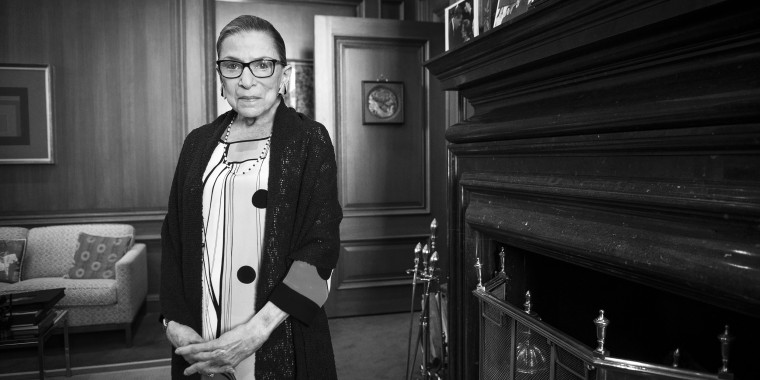U.S. Supreme Court Justice Ruth Bader Ginsburg has died. Senate Republicans, don’t make us bury our faith in government along with her.
Ginsburg’s death, and the vacancy she leaves on the Supreme Court, comes at a surreal moment in an already uncanny election. Supreme Court justices are enormously powerful and have lifetime appointments. They wield tremendous power in our democracy but they are not democratically elected. Even in normal times, their deaths or retirements spark a macabre guessing game about who will replace them. But these are not normal times, and the sitting president should not nominate Ginsburg’s replacement.
These are not normal times, and the sitting president should not nominate Ginsburg’s replacement.
If the past is prologue, President Donald Trump, with a shameful assist by Senate Majority Leader Mitch McConnell, R-Ky., will fill the new vacancy on the court with record-breaking speed. McConnell has made clear that he intends to do just that. The Kentucky senator has made confirming federal judges and filling the judiciary with conservative jurists one of his biggest priorities.
McConnell and Trump have both made statements praising Ginsburg’s life and legacy. Yet, they stand now prepared to trample it. On her deathbed, Ginsburg said, “My most fervent wish is that I will not be replaced until a new president is installed.”
There are two related questions to ask here. The first is: Can McConnell and Trump try and push through a nominee before November? The second is: Should they?
The answer to the first question is simple: Yes, legally, they can. But to answer the second, let’s go back a few years to the death of Supreme Court Justice Antonin Scalia, a dear friend of Ginsburg’s, in February 2016, nine months before the 2016 presidential election. Approximately one hour after his death, McConnell announced that the Senate would not hold confirmation hearings for anyone President Barack Obama chose to nominate. McConnell claimed, without any legal basis, that Supreme Court vacancies should not be filled in election years.
McConnell waxed poetic about the importance of letting the American people vote for the person who would nominate the next Supreme Court justice. But, of course, the American people did: They elected Obama for a full four-year term, with all of the rights and duties that come along with the power of the presidency. There was no place on the 2012 ballot that said Obama would serve for three years as a president with the power to nominate federal judges and then relinquish that power in his last year in office.
Now, we have another Supreme Court vacancy, not just in an election year, but in the homestretch of a wrenching election cycle. Approximately one hour after the death of the Supreme Court justice, McConnell said, “President Trump’s nominee will receive a vote on the floor of the United States Senate.” This is breathtaking hypocrisy. And it will likely work.
McConnell has tried to draw a distinction between the vacancy left by Scalia with that left by Ginsburg by saying Supreme Court seats should only be held open when the Senate and the presidency are controlled by different parties. This is not tortured logic; it is not logic at all.
We should at some point just be honest. McConnell is seizing on Ginsburg’s death as an opportunity to solidify the conservative leaning of the Supreme Court for decades to come — as we knew he would. This is about raw partisan power. There is no legitimate explanation beyond that. Sometimes things are exactly as they appear.
Until Ginsburg’s death, the Supreme Court was divided 5-4, with conservatives in the majority. Chief Justice John Roberts, the center of the court, went to great lengths last term to try to maintain the integrity of the court and ensure that not all of the blockbuster decisions broke 5-4 along ideological lines. But to quote W.B. Yeats, “the center cannot hold” if Trump nominates someone to fill Ginsburg’s vacancy. The court will almost certainly break quickly and starkly to the right.
What would a Supreme Court dominated by conservatives mean? It will likely mean, among other things, the expansion of gun owners’ rights but the whittling away of protections for voters, women seeking to obtain access to an abortion, LGBTQ Americans seeking freedom from discrimination and immigrants seeking basic rights in this country. Or perhaps to put it in even starker terms: It could soon be a particularly precarious time for women and minorities in America.
To put it in even starker terms: It could soon be a particularly precarious time for women and minorities in America.
The Senate now requires only a bare majority, 51 votes, to confirm a Supreme Court nominee. In fact, McConnell eliminated the filibuster back in 2017 to ensure that Justice Neil Gorsuch, who filled Scalia’s vacancy, was confirmed. So Democrats cannot filibuster to block a Supreme Court nominee. There are currently 53 Republicans in the Senate. Meaning, America, get ready for another Trump nominee on the Supreme Court before Halloween.
If Trump is re-elected, he can and should fill the vacancy. But as it stands, he should listen to the precedent McConnell himself set in 2016, not because this is good precedent but because American democracy depends on politicians of both parties following the rules and fighting fair. This is the only way to maintain the integrity of the Senate and the Supreme Court. Of course, McConnell doesn’t and he won’t.
In the end, we mourn Justice Ruth Bader Ginsburg not just because of the legacy she leaves behind, but because of what her death means for our country going forward. Her life’s work is likely to unravel and so is the legitimacy of our governmental institutions if Trump and McConnell press on with their plan to fill this seat.


